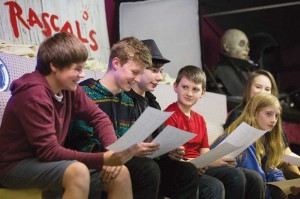When the family moved back to North Texas in 2006, it was to Mark’s father’s house in Weatherford.
“I missed my family,” said Twila. “I wanted the kids to grow up with the rest of the cousins, aunts, uncles, and grandparents.” While the living space itself is modest, the house sits on a large plot of land. The land and a former machine shop would play starring roles in the next act of the Barnett family story.

Her husband and children helped convert her father-in-law’s former machine shop into the studio that it is now, with a stage and bleachers. (The adult observers sit in chairs on the stage to watch performers, while the students sit in the bleachers.) Outside, the property accommodates an unpaved parking area for students’ families and an obstacle course for stunt performers.
Classes are offered in the evenings and on weekends to fit around regular school hours. The tuition is $100 per month for a general acting class, with everything else — including teleprompter reading, improv, lighting, set safety, life skills, history of wardrobe and props — included. The school is open to anyone who can pay, and scholarships are available to those who can’t. Twila has about 40 students enrolled now, though the number tends to fluctuate.
During interviews, the word “family” keeps surfacing. Indeed, the school encourages such an environment. Parents of students are allowed to observe the proceedings, but occasionally they’re drafted into reading lines or otherwise helping with the sessions.
Occasionally, the parents become students themselves, like Tony Lee Yates, a solidly built 49-year-old engineer who maintains the electrical systems at a hospital. He never gave a thought to acting until his daughter Kaylee enrolled in the school six years ago. (She is now 14, and her professional credits list her as Janay Yates.) Now he has a sideline as an actor — in the recently completed period football movie My All American, he plays Texas Tech head football coach J.T. King opposite Aaron Eckhart’s Darrell Royal.
“I wouldn’t have had any of this if it wasn’t for Miss Twila,” he said.
Kaylee cites the acting exercises as a means of bringing her and her parents closer together (her mother Susynn is also a student). “It just helped us get a lot of things off our chests,” she said.
Back on the school stage, my closely watched interview process is now focused on Makenna Clark, a bubbly 11-year-old girl with mismatched socks. (“Sometimes I have to leave the house in a hurry, so I just grab the first two socks I can find.”) She has just signed with an agent but is much more eager to tell me about the improv games that she plays in class, like “Bus Stop,” in which a character is approached by various strangers at a bus stop.

Brandi Knight is a 45-year-old former construction worker, originally from Missouri, whose slender, long-haired son Maverick, now 13, decided on a whim to enroll in the school and learn to be a stunt performer. Since then, Brandi has taken acting lessons as well, and she joined the school as a staffer in 2008, concentrating on the academy’s stunt side. In exchange for her help at the school, WACT has given Maverick a scholarship.
“Above all, this is a safe place for kids to express themselves,” she said.
A similar sentiment is expressed by Brad Stalkfleet, a tall postal carrier with a booming voice and an energy that belies his 60 years. He started taking classes only a few months ago, but he’s already landed the role of Simon in WACT’s stage production about the birth of Jesus.
“Whenever I’m not at work, I find a reason to be here,” he said. “This place truly is a family.”
Barnett’s teaching methods might be described as holistic.
“Most acting schools teach [separate] classes for commercials, for auditions, for theater, for film, and they make money off each one,” she said. “We operate differently.” Classes are grouped by students’ age, but each lesson is tailored to a specific aspect of acting or film production, depending sometimes on how the previous class has gone.
I get a chance to see her philosophy in action during a session with five small girls no older than 7. They are only beginners, so they occasionally stumble over their lines, even though Barnett tells them that they’re free to improvise the story.
The script they’re handed is for a commercial for a fictitious brand of peanut butter. The girls are supposed to talk about how their mothers substituted a different, inferior brand.
Barnett asks the girls what their favorite foods are, and when one says blueberries, Barnett asks her, “What if you didn’t have blueberries for a very long time? What if your mom said she had some for you, and you opened your mouth and she put an olive in it?”
Teaching little kids to become commercial pitchmen may seem crass, but Barnett explains to parents that actors of these girls’ age usually only book commercial work. Furthermore, kids’ familiarity with TV commercials helps her introduce them to other concepts, like dramatic monologues, that will stand them in good stead in any kind of acting.
The scripts have words in boldface to show the girls which words to emphasize. Pauses are written in as well. Not only do they rehearse the monologue, but Barnett also puts them through a full role-playing exercise, teaching them what will be expected in a real-life audition. She introduces them to the terms “resumé” and “headshot.” The girls practice entering the audition room, handing these items to the people running the audition, and greeting them. The session breaks up after an hour.
The next evening, a class for children ages 12 to 14 runs two hours. It starts with an exercise in quick reading, as the pre-teens read from a script in which someone wonders what time it is, with each actor focusing on delivering his or her line immediately after the previous one is said. Barnett calls this a “Disney” exercise, since it calls for the sort of high energy and unrealistically bright attitude that you might find on one of the Disney Channel’s TV shows.











